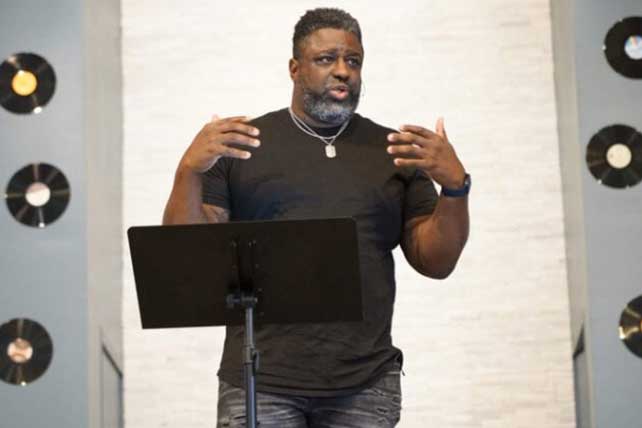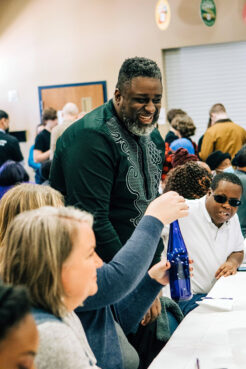(RNS) — When pastor Lamar Hardwick was diagnosed with autism at age 36, it was like he was meeting himself for the first time.
“I spent my whole life not knowing what people wanted from me, what they expected from me,” Hardwick told Religion News Service in a Zoom call from his home in Georgia. “When I was diagnosed, it was like for the first time I understood I was human.”
Not long after his life-changing diagnosis, Hardwick began blogging about faith and autism. A few viral posts later, he adopted the moniker given to him by one of his new online connections: The Autism Pastor. He was soon speaking at national conferences and securing book deals, all while pastoring a church, completing a Doctor of Ministry program (and, later, starting a Ph.D.) and ministering directly to folks on the autism spectrum. Described by friends and colleagues as “brilliant” and “surprisingly funny,” Hardwick is also known for his dynamic sermons.
RELATED: Autism and Church “Welcome aboard our church…please locate the exit nearest you”
“He’s soft-spoken, until he’s preaching,” said Larry Asplund, who served on a pastoral team with Hardwick.
Recently, Hardwick has faced another earth-shattering diagnosis: stage 4 cancer. While his treatment has forced him to retire from his church at age 45, his hope-filled mantra for this season comes directly from Scripture: “I will not be shaken,” Hardwick quoted to RNS from the Psalms. Even as his body copes with the cyclical aftershocks of prolonged chemotherapy, he remains a prolific writer, especially on nights when steroids keep him wired. His next book, “How Ableism Fuels Racism: Dismantling the Hierarchy of Bodies in the Church,” is set to be released from Brazos Press later this month, and he has another two books in the works.
Pastor Lamar Hardwick participates in the Tri-Cities Church 10th Anniversary Celebration in East Point, Ga. (Photo by Kamesha Yvonne Photography)
Hardwick’s early life was shaped by his father’s dual career as a Missionary Baptist Church pastor and member of the U.S. army. He was born in Killeen, Texas, but moved frequently in childhood, including to Germany for nearly four years, and the destabilization didn’t help with the social challenges he faced as a kid with undiagnosed autism.
“It felt like the whole world was in on an inside joke that I didn’t get,” Hardwick told RNS.
In church, Hardwick appreciated the predictable rhythms and rituals: Communion every first Sunday, choir practice on Wednesdays, Sunday school. In his historically Black church context, autism and other disabilities usually went unmentioned. The exception was the disabled folks on the “sick and shut-in list” that embellished the back of the bulletin.
Despite his academic abilities, by high school Hardwick was still struggling socially. He found a remedy in the form of drugs and alcohol.


